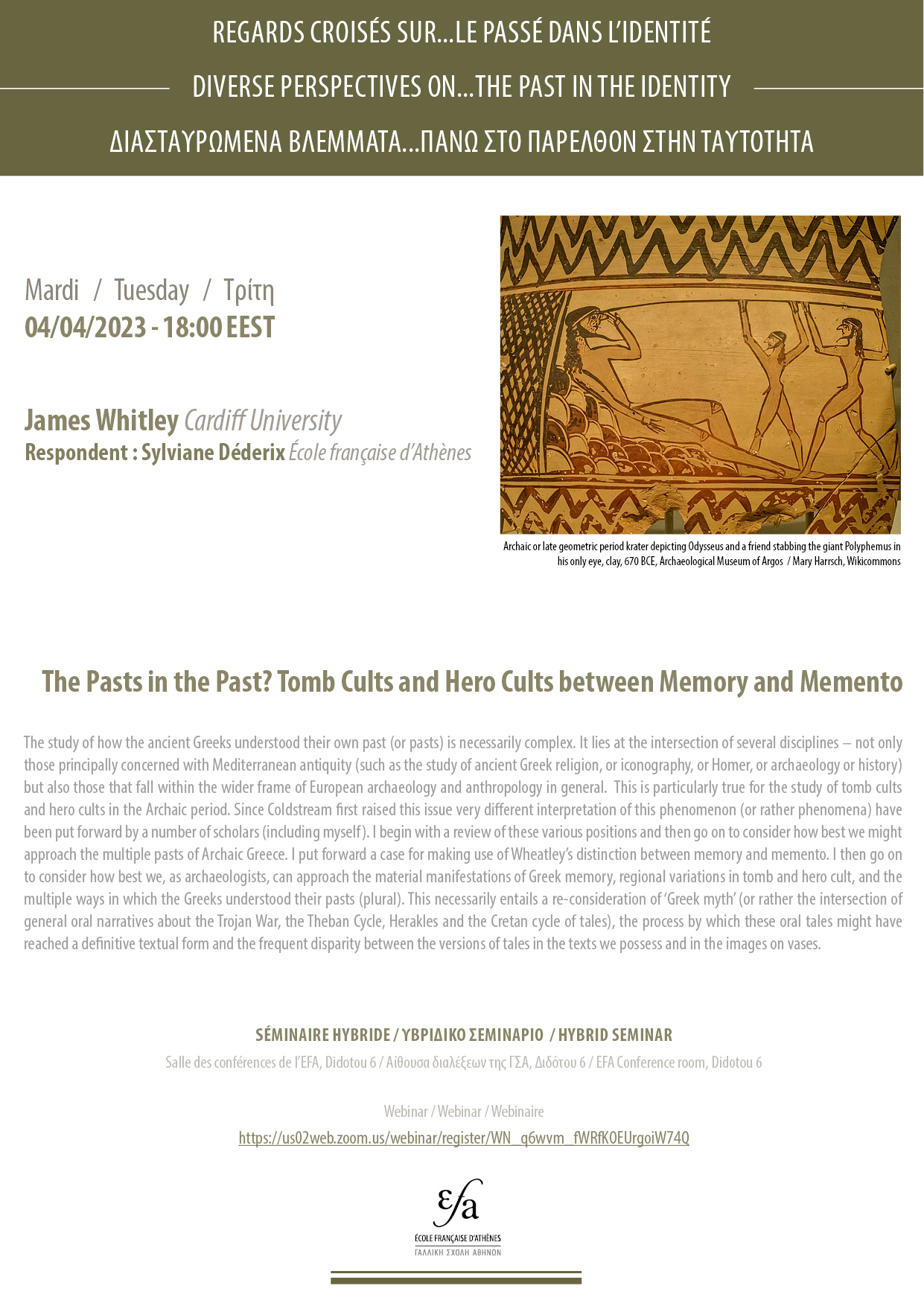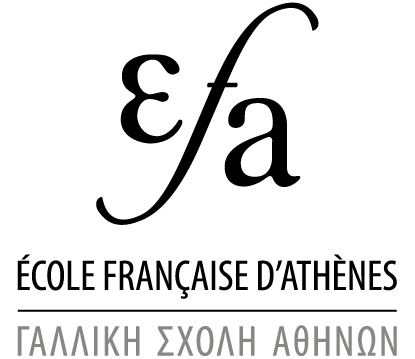
The Pasts in the Past? Tomb Cults and Hero Cults between Memory and Memento
James Whitley Cardiff University
Respondent : Sylviane Déderix École française d’Athènes
Séminaire hybride / Υβριδικό σεμινάριο / Hybrid seminar
=> Salle des conférences de l’EFA, Didotou 6 / Αίθουσα διαλέξεων της ΓΣΑ, Διδότου 6 / EFA Conference room, Didotou 6
=> Inscription au webinaire / Εγγραφή στο webinar
Περίληψη / Resume / Résumé
The study of how the ancient Greeks understood their own past (or pasts) is necessarily complex. It lies at the intersection of several disciplines – not only those principally concerned with Mediterranean antiquity (such as the study of ancient Greek religion, or iconography, or Homer, or archaeology or history) but also those that fall within the wider frame of European archaeology and anthropology in general. This is particularly true for the study of tomb cults and hero cults in the Archaic period. Since Coldstream first raised this issue very different interpretation of this phenomenon (or rather phenomena) have been put forward by a number of scholars (including myself). I begin with a review of these various positions and then go on to consider how best we might approach the multiple pasts of Archaic Greece. I put forward a case for making use of Wheatley’s distinction between memory and memento. I then go on
to consider how best we, as archaeologists, can approach the material manifestations of Greek memory, regional variations in tomb and hero cult, and the multiple ways in which the Greeks understood their pasts (plural). This necessarily entails a re-consideration of ‘Greek myth’ (or rather the intersection of general oral narratives about the Trojan War, the Theban Cycle, Herakles and the Cretan cycle of tales), the process by which these oral tales might have reached a definitive textual form and the frequent disparity between the versions of tales in the texts we possess and in the images on vases.
to consider how best we, as archaeologists, can approach the material manifestations of Greek memory, regional variations in tomb and hero cult, and the multiple ways in which the Greeks understood their pasts (plural). This necessarily entails a re-consideration of ‘Greek myth’ (or rather the intersection of general oral narratives about the Trojan War, the Theban Cycle, Herakles and the Cretan cycle of tales), the process by which these oral tales might have reached a definitive textual form and the frequent disparity between the versions of tales in the texts we possess and in the images on vases.
#regardscroisesLe séminaire « Regards croisés sur … », de nature fondamentalement diachronique, rassemble les membres scientifiques de l’EFA autour d’une thématique commune destinée à se renouveler chaque année. Régulièrement, un ou deux membres scientifiques invitent un.e expert.e à présenter des travaux en résonance avec leurs propres recherches en cours à l’EFA.
La thématique adoptée en 2023, pour la deuxième édition de ce séminaire, porte sur les liens entre passé et construction identitaire. Plusieurs aspects sous-tendent cet objet large. Au-delà de la réception de l’antique dans les sociétés modernes, l’enjeu est d’explorer de manière diachronique les processus d’appropriation, d’utilisation, de création et de resémantisation du ou des passé(s), dans le cadre de constructions identitaires par les sociétés et groupes humains. L’anachronisme est un point central dans cette démarche, les conflits entre passé et présent, entre histoire et mémoire ou entre différents régimes d’historicité étant considérés comme les indices des écarts et déformations inhérents aux usages du passé pour lier un groupe à travers un récit commun. Les formes d’appropriation et de réappropriation du passé peuvent être appréhendées à partir des textes, des images, de l’architecture, des paysages ainsi que de la culture matérielle et immatérielle. Le caractère multiple et fluide de l’identité, comme de sa perception, de la mise en récit et de la réécriture du passé, sont autant d’éléments qui seront au cœur de notre réflexion.
Programme 2023« Diverse perspectives on… » is a diachronic seminar that brings the scientific members of the EFA together around a common theme meant to be renewed every year. Regularly, one or two scientific members invite an expert to present research that echoes their ongoing work at the EFA.
The theme adopted in 2023 for the second edition of this seminar regards the links between the past and the construction of identity. Several aspects underlie this broad subject. Beyond the reception of the antiquity in modern societies, the goal is to explore diachronically the processes of appropriation, use, creation and re-signification of the past(s), within the framework of identity constructions by societies and human groups. Anachronism is a focal point in this approach, with conflicts between past and present, history and memory, or between different regimes of historicity seen as reflecting gaps and distortions inherent in the uses of the past that aim to bind a group together through a common narrative. The forms of appropriation and reappropriation of the past can be approached through texts, images, architecture, landscapes as well as material and immaterial culture. The multiple and fluid nature of identity and its perception, of narrating and rewriting the past, will thus be at the heart of our reflection.
Programme 2023
La thématique adoptée en 2023, pour la deuxième édition de ce séminaire, porte sur les liens entre passé et construction identitaire. Plusieurs aspects sous-tendent cet objet large. Au-delà de la réception de l’antique dans les sociétés modernes, l’enjeu est d’explorer de manière diachronique les processus d’appropriation, d’utilisation, de création et de resémantisation du ou des passé(s), dans le cadre de constructions identitaires par les sociétés et groupes humains. L’anachronisme est un point central dans cette démarche, les conflits entre passé et présent, entre histoire et mémoire ou entre différents régimes d’historicité étant considérés comme les indices des écarts et déformations inhérents aux usages du passé pour lier un groupe à travers un récit commun. Les formes d’appropriation et de réappropriation du passé peuvent être appréhendées à partir des textes, des images, de l’architecture, des paysages ainsi que de la culture matérielle et immatérielle. Le caractère multiple et fluide de l’identité, comme de sa perception, de la mise en récit et de la réécriture du passé, sont autant d’éléments qui seront au cœur de notre réflexion.
Programme 2023« Diverse perspectives on… » is a diachronic seminar that brings the scientific members of the EFA together around a common theme meant to be renewed every year. Regularly, one or two scientific members invite an expert to present research that echoes their ongoing work at the EFA.
The theme adopted in 2023 for the second edition of this seminar regards the links between the past and the construction of identity. Several aspects underlie this broad subject. Beyond the reception of the antiquity in modern societies, the goal is to explore diachronically the processes of appropriation, use, creation and re-signification of the past(s), within the framework of identity constructions by societies and human groups. Anachronism is a focal point in this approach, with conflicts between past and present, history and memory, or between different regimes of historicity seen as reflecting gaps and distortions inherent in the uses of the past that aim to bind a group together through a common narrative. The forms of appropriation and reappropriation of the past can be approached through texts, images, architecture, landscapes as well as material and immaterial culture. The multiple and fluid nature of identity and its perception, of narrating and rewriting the past, will thus be at the heart of our reflection.
Programme 2023
CONTACTSAssistance administrative pour la Direction des Études
secretariat.dir_etudes@efa.gr
+ 30 210 36 79 904Nolwenn Grémillet
Communication
nolwenn.gremillet@efa.gr
+ 30 210 36 79 943
secretariat.dir_etudes@efa.gr
+ 30 210 36 79 904Nolwenn Grémillet
Communication
nolwenn.gremillet@efa.gr
+ 30 210 36 79 943

